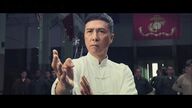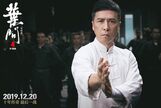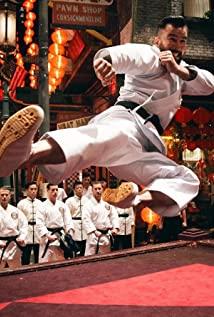"Broken walls, dry wells, Wing Chun is like a shadow"
Just like the image drawn by the ending song, "Ip Man", the largest martial arts IP in the mainland market in the past ten years, finally grasped itself when it exited the curtain.
Looking back at the shock when "Ip Man 1" appeared on the stage, the mainland market finally found a different way out for the theme. With the increasingly obvious feature of "reflecting the times in person" in the mainland market, Donnie Yen played Ip Man in one fell swoop. into people's hearts. He is a "wife-fearing person", and he is a martial artist who uses "women's fist". He does not accept apprentices, and he is not good at meaningless martial arts. He enjoys himself and cultivates himself by martial arts. This is the hero that the Chinese people yearn for most in their inner world. The "elegance" of Ip Man has been fully developed in the entire Ip Man series.
The birth of "Ip Man 1" officially detonated the genre trend that puts martial arts in the era. Ye Wen in the play was originally an ordinary big family, and he did not explain the hardships on his way to learning martial arts. But due to the advent of the war, Ye Wen's path of suffering really began. This also confirms a very important concept in the Ip Man series: martial arts, which needs to be considered in the era.
Therefore, the Ip Man series is different from other martial arts movies. The arc of the movie is not the growth of Ip Man's own martial arts or mentality, but the embodiment and development of his wisdom in the era. The embodiment of this spirit is the first shot after Ye Wen's victory. I think this is the most vivid shot in the entire Ip Man series. The amount of information it brings is unmatched in the previous martial arts narratives. He not only proposed the end of martial arts, but also completely put Ye Wen in the hands of the times.
In order to reflect the subjectivity of the times and Ip Man, many subplots have been inserted in the Ip Man series, and these subplots all focus on the themes of the times and make Ip Man's embodiment in the times more concrete.
Therefore, the most important criterion for evaluating the quality of the fourth finale is whether it implements this original intention. And let Ye Wen, a hero who became a hero due to the turbulence of the times, return to the times.
I think Part 4 did it. The context of returning to the era is quite complete in the fourth part. His cancer symbolized his passive position in destiny, and he finally gave up his historical significance as a patriarchal language and fully embraced his son. Judging from the context presented by the film, the idea of the final chapter is correct, and it is a correction to the mistakes of the third part.
Ip Man's attributes have always been passive, and he has been following the crowd all his life, from Foshan to Hong Kong, from Hong Kong to the United States. He only does what he should do, he does not challenge the times, he controls himself in the times. This is the most essential meaning of the Ip Man series as the largest IP of Chinese martial arts genre films. A person who does not compete for victory or defeat, a martial arts warrior who uses martial arts to pass on his soul.
In order to interpret Ip Man, in order to reflect that he is a personal hero rather than a hero of the times, the structural characteristics of Ip Man series will be inevitable. From 1 to 4, Ip Man has not made a breakthrough in the narrative structure, the only difference is the film context. The first part is to speak for the Chinese people, the second part narrows the scope and speaks for the nation, and the interpretation of the third part is a relative failure, not really finding a breakthrough in the Ip Man series. The fourth volume is to speak for all nations.
Therefore, the audience sees Ye Wen as a person who fights wherever he goes, and a person who wins wherever he goes. Since Ye Wen himself does not need the arc of the movie, he will not be knocked down in the scene, there is always a difference Instead of being defeated by someone close to his beliefs (Wu Chilin to President Wan), Ye Wen has always been a hero held in the collective, and his victory will always be a collective victory (this is also a mistake in the third part). The main reason is that the kernel of the Ye Wen series was wrongly judged).
To sum up, Ye Wen's success is the success of martial arts narrative, and it is the perfect landing from an absolute ideal hero to a real hero.
And this era of martial arts genre films will also move towards a new beginning with the end of Ye Wen.
The above are all interpretations of the advantages of the Ip Man series, which are the conditions for the Ip Man series to become an IP in the market era. And the era of the next martial arts genre is precisely based on the deficiencies of the Ip Man series.
The appearance of "Ip Man 1" was at the beginning of China's industrialized films. The unique Chinese-style martial arts in martial arts films also became the rebellion of the mainland market against mainstream commercial films in Europe and the United States. . But it needs to be admitted that it was unsuccessful as an industrialized film. Although the four Ip Man films have made great progress, they still cannot escape the limitation.
The industrial failure of the Ip Man series is also the industrial failure of Chinese martial arts films. The neglect of the most basic audio-visual language and the excessive separation of the director and the action director all lead to the extreme scarcity of the texture of the film itself. The fourth part has many flaws. President Wan's daughter is very dramatic, and the overall lines are basically out of the real context. Lots of aimless shots, and no basic respect for space and physical relationships. Although the rhythm in the martial arts stage is good, this goodness is based on the show-like performance. It can be said that from the point of view of the film itself, it is quite unqualified and expresses Ye Wen with a show-off attitude.
The standard of audio-visual language in the Ip Man series is quite low, and its purpose is to serve the detonation of the moment when Ip Man destroys the opponent. It is an industrialized standard for a complete consumer audience, which is substandard and irresponsible.
As the epitome of the Chinese martial arts genre, the Ip Man series presents the most basic lack of Chinese martial arts films: the demand for self. The main theme movie + Chinese characteristic technology, the entire market serves the obscenity for the domestic audience, the audience just wants to see how Ye Wen as a nation defeats other nations, and martial arts is just one of the mediums. It can be said that the entire martial arts market does not regard martial arts as a goal. The martial arts films produced with such a concept are distorted from the beginning, separated from the essence of the film, and become a fraud in the market.
In "Ip Man 4", this obscenity is reflected most strongly. The words of President Wan's daughter's counterattack are extremely unreasonable, it is a pure rebellion (a direct accusation of white people's attributes), all white villains are masked, and in the sense of the play, white people and muscular brats are completely equal, for the sake of comparison And contrast. This national obscenity is conducive to commercial export, but it cannot be regarded as the goal and responsibility of the filmmaker.
If you want Chinese martial arts to really go to the world, you must break through this barrier.
Therefore, the Ip Man series also presents problems for new martial arts genre films. Its end is inevitable.
From a formal point of view, Lu Dao has made a good start in the mastery of material space, and is committed to improving the texture of martial arts films. In terms of material, the films directed by Xu Haofeng show a complete understanding of the world of martial arts. "Arrower and Willow White Ape" and "Master" are new breakthroughs in the audio-visual language of martial arts films. "Shadow" directed by Zhang Yimou and "The Grand Master" directed by Wong Kar Wai both take martial arts as the core of the story, giving martial arts a dominant position in the narrative.
Yes, the end of the Ip Man series symbolizes the end of an era, and a new generation of filmmakers has climbed up in the vacancy of their predecessors, giving the martial arts genre its unique movie flavor, making martial arts films no longer a kind of only A business mystery recognized by Chinese talents, but to reproduce the glory of Crouching Tiger, Hidden Dragon, and make Chinese martial arts truly become a national feature in the era of film industrialization and a national feature recognized by the world.
Supplement: There is also a very charming symbol in "Ip Man 4": the burning wooden dummy pile corresponds to the burning smoke, which means that the wooden dummy pile is the meaning of Ye Wen's life. The foreshadowing of the four films broke out in the final father-son inheritance.
The wooden dummy is a portrayal of Ye Wen's life, swaying in the blow of the times, but standing still after all, because it has never been forgotten, because it has never been betrayed.
The ending of this metaphor alone deserves our applause.
View more about Ip Man 4: The Finale reviews










